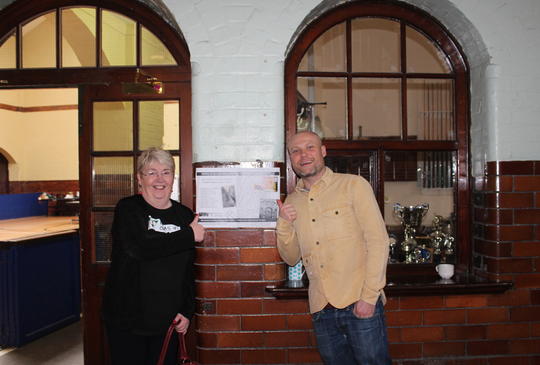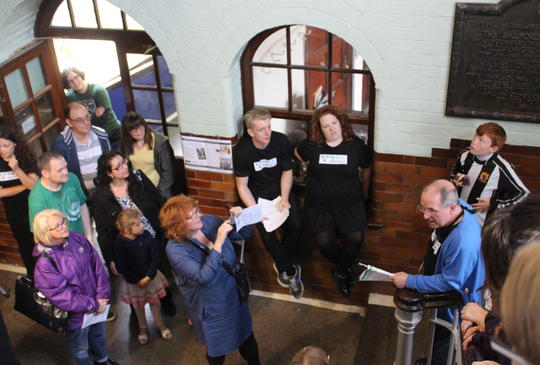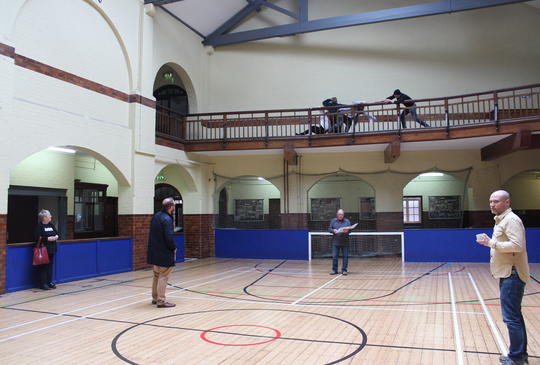
An immersive promenade through Ordsall’s history
The stories of historical Ordsall residents were brought to life this month as part of an imaginative immersive play at the Salford Lads Club.
‘Ordsall History Play’ staged compelling tales from the area’s history on 20 June.
Audiences turned up at the renowned club in Salford on the pretence of attending a Smiths-themed tour. When the guide failed to turn up, a historical expert instead took audiences into the club for promenade-style performances throughout the striking building.
“We fell in love with the building, and it seemed like such a shame to just use one room,” says playwright Chris Hoyle. “We wanted to use as much of the club as possible, so we started outside the club, underneath the iconic sign. Everyone thinks the Smiths put Ordsall on the map, but actually there was so much going on in this area before that.”
The play is the brainchild of local resident Rosemary Swift, who spent months delving into historical archives from the 19th and 20th centuries, tracking the families who lived in the streets surrounding the club, as well as uncovering some unusual and intriguing anecdotes.

The staged vignettes included an incident in 1831 where a group of marching soldiers caused the Broughton Suspension Toll Bridge, crossing the River Irwell, to collapse. This prompted the British Army to issue an order that troops should ‘break step’ when crossing bridges, a requirement still in place today.
“Another of the stories is a poisoning – Salford’s answer to Romeo and Juliet – John and Dinah,” says Hoyle. In 1840 Private John Binks, aged just 20, was to be redeployed from Salford Barracks and was told he couldn’t take his girlfriend Dinah Spence with him. The pair tragically killed themselves to avoid being separated.
The stories were enacted by five performers from Manchester-based theatre company Box of Tricks.
For Swift, her research and the resulting play has a special meaning. “Many of my friends are really excited to see the play because they used to live on this estate,” she says. “And even though I’m laughing about being a Manchester girl, I’ve been living in Salford for 50 years now. I lived three doors down from the club for the first three years of my marriage. My husband – who’s 81 this month – still comes to the club twice a week.”
"Rosemary developed her historical research by looking for census information about the houses of family, friends and neighbours in the Ordsall area. She supplemented this with newspaper records, historical accounts and locals' memories to build up a comprehensive picture of Ordsall life in Victorian and Edwardian times," says Jessica Symons, Research Fellow at the University of Salford’s Centre for Sustainable Urban and Regional Futures (SURF) in the School of the Built Environment. “It has become really personal. She knows the relatives of a lot of people who lived here. That’s a really important part of this – that people feel a visceral connection.”

The Ordsall History Play was supported and funded through the Ideas4Ordsall initiative, which supports local people’s creative ideas, backing them through the development and production process. The University of Salford initiative is part of a larger project funded by the Arts and Humanities Research Council as part of their Connected Communities programme. From bike workshops, to arts and crafts activities, an observation beehive and artists’ collective, the scheme supports 20 different projects which are valuable to the local community.
Since January, Symons and SURF have been working with four cultural intermediaries who are based in the Ordsall area. These intermediaries are freelance artist Amber Sanchez, Lets Go Global, Ordsall Community Arts, and Chapel Street Community Arts.
“These four are known to people in the community and have good relationships with them,” says Symons. “When I was doing my field work, it was obvious to me that this was a very close, tight-knit community. And the only way of developing a good working relationship quickly was to work with those intermediaries.”

Another of Ideas4Ordsall’s supported ideas is the Islington Community Festival, taking place on 11 July. Meanwhile, the Ordsall Arts Collective is a group of fine artists who have got together to show their work and sell their wares at pop-up shops. There are also cycle workshops and bee hives at local allotments.
“What I’m really keen to share, in my research findings, is that if you scratch the surface of any community, you will find people who are really passionate about lots of diverse things. Ordsall is listed on government and council documents as an area of deprivation – and yet you come into this community and there are loads of things that people are passionate about and interested in. That somehow gets lost in the negative language of deprivation; these passions aren’t recognised. So for us it’s about demonstrating that if you scratch the surface you’ll find these things going on.”
Find Out More
@Ideas4Ordsall @cultintermed
http://www.ideas4ordsall.org/ https://culturalintermediation.wordpress.com/
Pendleton Together: Self cynical. Radical. Curious. Ironic. Brutal. Wonderful.
Contributed by Rebecca Nicholl
Contributor Profile
Clare is a journalist covering culture and social affairs. With a degree in law and masters’ in journalism, her work has been published in The Guardian, The Huffington Post, Digital Spy, Creative Tourist and many others. Born in Ireland, Clare lived in Luxembourg and Texas, before settling in Manchester.



